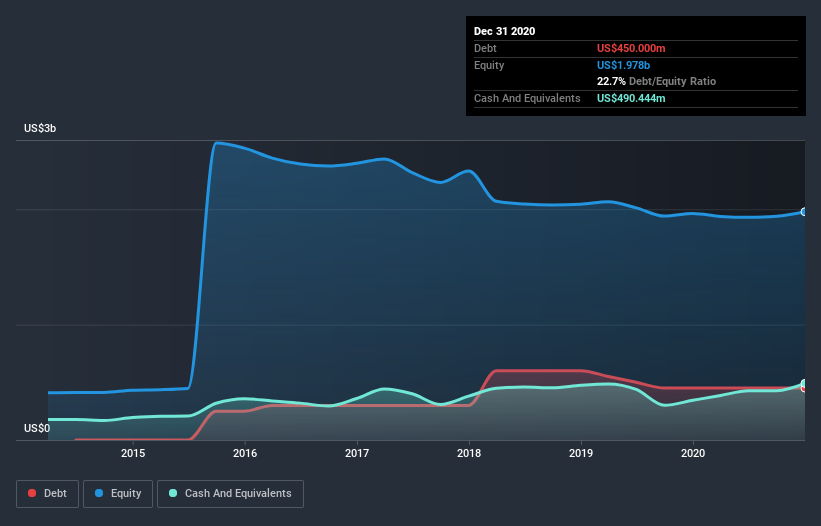Is NetScout Systems (NASDAQ:NTCT) A Risky Investment?
Legendary fund manager Li Lu (who Charlie Munger backed) once said, 'The biggest investment risk is not the volatility of prices, but whether you will suffer a permanent loss of capital.' So it might be obvious that you need to consider debt, when you think about how risky any given stock is, because too much debt can sink a company. Importantly, NetScout Systems, Inc. (NASDAQ:NTCT) does carry debt. But is this debt a concern to shareholders?
What Risk Does Debt Bring?
Debt is a tool to help businesses grow, but if a business is incapable of paying off its lenders, then it exists at their mercy. In the worst case scenario, a company can go bankrupt if it cannot pay its creditors. While that is not too common, we often do see indebted companies permanently diluting shareholders because lenders force them to raise capital at a distressed price. By replacing dilution, though, debt can be an extremely good tool for businesses that need capital to invest in growth at high rates of return. The first step when considering a company's debt levels is to consider its cash and debt together.
View our latest analysis for NetScout Systems
How Much Debt Does NetScout Systems Carry?
The chart below, which you can click on for greater detail, shows that NetScout Systems had US$450.0m in debt in December 2020; about the same as the year before. But it also has US$490.4m in cash to offset that, meaning it has US$40.4m net cash.
How Strong Is NetScout Systems' Balance Sheet?
According to the last reported balance sheet, NetScout Systems had liabilities of US$396.2m due within 12 months, and liabilities of US$771.9m due beyond 12 months. Offsetting this, it had US$490.4m in cash and US$208.0m in receivables that were due within 12 months. So its liabilities total US$469.6m more than the combination of its cash and short-term receivables.
While this might seem like a lot, it is not so bad since NetScout Systems has a market capitalization of US$2.15b, and so it could probably strengthen its balance sheet by raising capital if it needed to. But it's clear that we should definitely closely examine whether it can manage its debt without dilution. While it does have liabilities worth noting, NetScout Systems also has more cash than debt, so we're pretty confident it can manage its debt safely.
Notably NetScout Systems's EBIT was pretty flat over the last year. We would prefer to see some earnings growth, because that always helps diminish debt. The balance sheet is clearly the area to focus on when you are analysing debt. But it is future earnings, more than anything, that will determine NetScout Systems's ability to maintain a healthy balance sheet going forward. So if you want to see what the professionals think, you might find this free report on analyst profit forecasts to be interesting.
Finally, a company can only pay off debt with cold hard cash, not accounting profits. NetScout Systems may have net cash on the balance sheet, but it is still interesting to look at how well the business converts its earnings before interest and tax (EBIT) to free cash flow, because that will influence both its need for, and its capacity to manage debt. Happily for any shareholders, NetScout Systems actually produced more free cash flow than EBIT over the last two years. There's nothing better than incoming cash when it comes to staying in your lenders' good graces.
Summing up
Although NetScout Systems's balance sheet isn't particularly strong, due to the total liabilities, it is clearly positive to see that it has net cash of US$40.4m. The cherry on top was that in converted 545% of that EBIT to free cash flow, bringing in US$212m. So we don't have any problem with NetScout Systems's use of debt. When analysing debt levels, the balance sheet is the obvious place to start. But ultimately, every company can contain risks that exist outside of the balance sheet. For instance, we've identified 1 warning sign for NetScout Systems that you should be aware of.
When all is said and done, sometimes its easier to focus on companies that don't even need debt. Readers can access a list of growth stocks with zero net debt 100% free, right now.
This article by Simply Wall St is general in nature. It does not constitute a recommendation to buy or sell any stock, and does not take account of your objectives, or your financial situation. We aim to bring you long-term focused analysis driven by fundamental data. Note that our analysis may not factor in the latest price-sensitive company announcements or qualitative material. Simply Wall St has no position in any stocks mentioned.
Have feedback on this article? Concerned about the content? Get in touch with us directly. Alternatively, email editorial-team (at) simplywallst.com.

